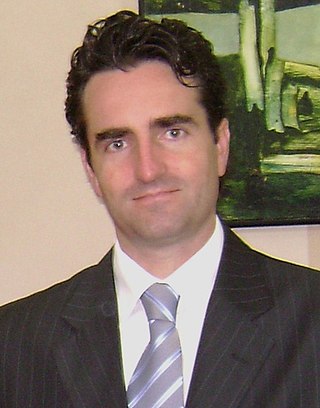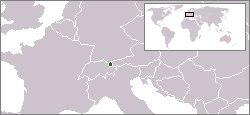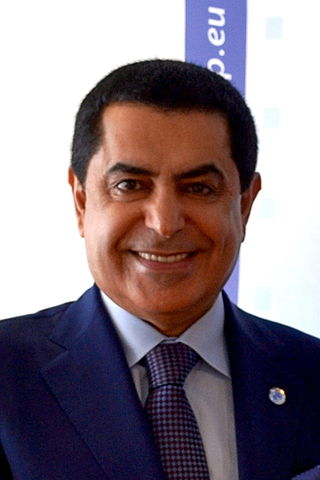
The International Criminal Court is an intergovernmental organization and international tribunal seated in The Hague, Netherlands. It is the first and only permanent international court with jurisdiction to prosecute individuals for the international crimes of genocide, crimes against humanity, war crimes and the crime of aggression. The ICC is distinct from the International Court of Justice, an organ of the United Nations that hears disputes between states.

The United Nations General Assembly is one of the six principal organs of the United Nations (UN), serving as its main deliberative, policymaking, and representative organ. Currently in its 78th session, its powers, composition, functions, and procedures are set out in Chapter IV of the United Nations Charter.

The member states of the United Nations comprise 193 sovereign states. The United Nations (UN) is the world's largest intergovernmental organization. All members have equal representation in the UN General Assembly.

Crimes against humanity are certain serious crimes committed as part of a large-scale attack against civilians. Unlike war crimes, crimes against humanity can be committed during both peace and war and against a state's own nationals as well as foreign nationals. Together with war crimes, genocide, and the crime of aggression, crimes against humanity are one of the core crimes of international criminal law, and like other crimes against international law have no temporal or jurisdictional limitations on prosecution.

The Rome Statute of the International Criminal Court is the treaty that established the International Criminal Court (ICC). It was adopted at a diplomatic conference in Rome, Italy on 17 July 1998 and it entered into force on 1 July 2002. As of February 2024, 124 states are party to the statute. Among other things, it establishes court function, jurisdiction and structure.
China is one of the members of the United Nations and is one of five permanent members of its Security Council. One of the victorious Allies of World War II, the Republic of China (ROC) joined the UN upon its founding in 1945. The subsequent resumption of the Chinese Civil War between the government of Republic of China and the rebel forces of the Chinese Communist Party, led to the latter's victory on the mainland and the establishment of the People's Republic of China (PRC) in 1949. Nearly all of Mainland China was soon under its control and the ROC government retreated to the island of Taiwan.

United Nations Security Council resolution 1422, adopted unanimously on 12 July 2002, after noting the recent entry into force of the Rome Statute of the International Criminal Court, the Council granted immunity from prosecution by the International Criminal Court (ICC) to United Nations peacekeeping personnel from countries that were not party to the ICC.
Parliamentarians for Global Action (PGA) is a non-profit, non-partisan international network of committed legislators, that informs and mobilizes parliamentarians in all regions of the world to advocate for human rights and the rule of law, democracy, human security, non-discrimination, gender equality, and climate justice. PGA Membership is open to individual legislators from elected parliaments. Currently, it consists of approximately 1,200 members in 139 parliaments. PGA was established in 1978 in Washington, D.C., by a group of concerned parliamentarians from around the world to take collective, coordinated and cohesive actions on global problems, which could not be successfully addressed by any one government or parliament acting alone. Founded during the Cold War era, an early focus and priority of the organization was the mobilization of parliamentarians worldwide in support of nuclear disarmament. The vision of PGA is "to contribute to the creation of a Rules-Based International Order for a more equitable, safe, and democratic world".

The United States is not a state party to the Rome Statute of the International Criminal Court, which founded the International Criminal Court (ICC) in 2002.

The states parties to the Rome Statute of the International Criminal Court are those sovereign states that have ratified, or have otherwise become party to, the Rome Statute. The Rome Statute is the treaty that established the International Criminal Court, an international court that has jurisdiction over certain international crimes, including genocide, crimes against humanity, and war crimes that are committed by nationals of states parties or within the territory of states parties. States parties are legally obligated to co-operate with the Court when it requires, such as in arresting and transferring indicted persons or providing access to evidence and witnesses. States parties are entitled to participate and vote in proceedings of the Assembly of States Parties, which is the Court's governing body. Such proceedings include the election of such officials as judges and the Prosecutor, the approval of the Court's budget, and the adoption of amendments to the Rome Statute.

United Nations Security Council Resolution 1593, adopted on 31 March 2005, after receiving a report by the International Commission of Inquiry on Darfur, the Council referred the situation in the Darfur region of Sudan to the International Criminal Court (ICC) and required Sudan to co-operate fully. It marked the first time the council had referred a situation to the court, and also compelled a country to co-operate with it.

Danny Danon is an Israeli politician and former diplomat. A member of the Likud party, Danon served in the Knesset from 2009 to 2015, and re-entered the Knesset in 2022. From 2015 to 2020, Danon served as Israel's 17th Permanent Representative to the United Nations. The former leader of the world Betar organization, Danon was elected Chairman of the World Likud. Considered a 'right-wing thorn in Netanyahu's side," Danon challenged Benjamin Netanyahu for the party's leadership in 2007 and 2014.
A Review Conference of the Rome Statute took place from 31 May to 11 June 2010, in Kampala, Uganda to consider amendments to the Rome Statute of the International Criminal Court. The Rome Statute established the International Criminal Court in 2002 as a permanent tribunal to prosecute individuals accused of the most serious crimes of international concern, and provided that a review conference be held seven years after the entry into force.

Bruno Stagno Ugarte was the Minister of Foreign Affairs of Costa Rica from 2006 to 2010 and was the president of the Assembly of States Parties of the International Criminal Court (ICC) from 2005 to 2008.

Christian Wenaweser is a Liechtenstein diplomat. He is currently serving as the Permanent Representative of Liechtenstein to the United Nations.

United Nations Security Council resolution 663, adopted unanimously on 14 August 1990, after examining the application of the Principality of Liechtenstein for membership in the United Nations, the Council recommended to the General Assembly that Liechtenstein be admitted.
Amendments to the Rome Statute of the International Criminal Court must be proposed, adopted, and ratified in accordance with articles 121 and 122 of the Statute. Any state party to the Statute can propose an amendment. The proposed amendment can be adopted by a two-thirds majority vote in either a meeting of the Assembly of States Parties or a review conference called by the Assembly. An amendment comes into force for all states parties one year after it is ratified by seven-eighths of the states parties. However, any amendment to articles 5, 6, 7, or 8 of the Statute only enters into force for states parties that have ratified the amendment. A state party which ratifies an amendment to articles 5, 6, 7, or 8 is subject to that amendment one year after ratifying it, regardless of how many other states parties have also ratified it. For an article 5, 6, 7, or 8 amendment, the Statute itself is amended after the amendment comes into force for the first state party to ratify it. Amendments of a purely institutional nature enter into force six months after they are approved by a two-thirds majority vote in either a meeting of the Assembly of States Parties or a review conference.

The Sixty-sixth Session of the United Nations General Assembly opened on 13 September 2011 at 15:00 and was presided over by former Qatari permanent representative to the UN Nassir Abdulaziz Al-Nasser. The session ended on 18 September as al-Nasser symbolically passed the gavel to the president of the next session, Vuk Jeremic.

Tiina Intelmann is an Estonian diplomat; she was the Permanent Representative of Estonia to the United Nations in New York from 2005 to 2011 and was the President of the Assembly of States Parties of the International Criminal Court from December 2011 until December 2014. Since then, she is the Head of the Delegation of the European Union to Liberia. Since 2017 she is the Estonian ambassador to the United Kingdom.
The 1973 United Nations International Convention on the Suppression and Punishment of the Crime of Apartheid was the first binding international treaty which declared the crime of apartheid and racial segregation under international law. It was adopted by the General Assembly on 30 November 1973 and came into force on 18 July 1976. It passed by 91 votes in favor, four against and 26 abstentions. 110 countries are currently parties to the convention, with 26 signatories.















